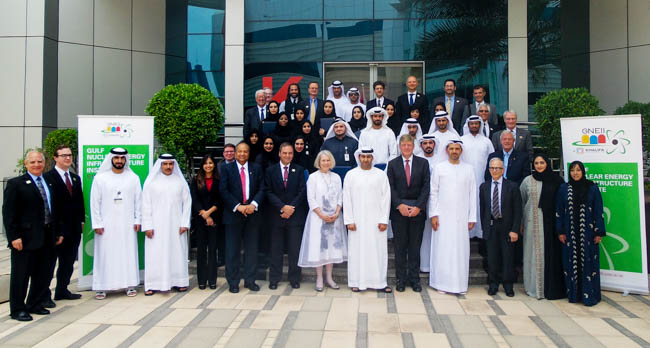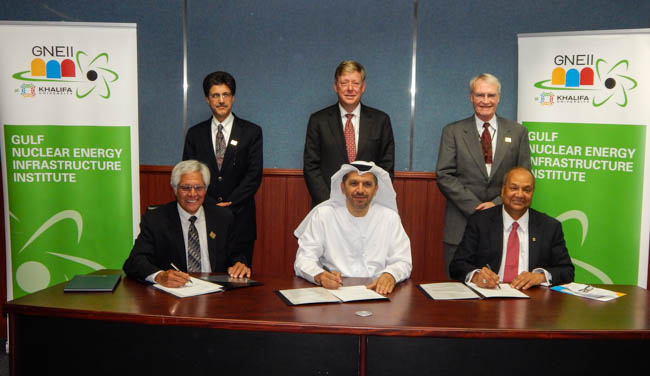
The Gulf Nuclear Energy Infrastructure Institute (GNEII) at Khalifa University’s Abu Dhabi campus in the United Arab Emirates (UAE) commemorated the conclusion of the sixth year of the program with a two-day symposium on nuclear safety, security, and safeguards on April 11-12. The event concluded with a graduation ceremony for this year’s fellows from the Emirates Nuclear Energy Corporation (ENEC), the Critical Infrastructure and Coastal Protection Authority (CICPA), and the Federal Authority of Nuclear Regulation (FANR). Nuclear Security Science and Policy Institute (NSSPI) Research Engineer Claudio Gariazzo, who was among the GNEII instructors, NSSPI Deputy Director Dr. David Boyle, and Texas A&M University Nuclear Engineering Department Head Dr. Yassin Hassan attended the symposium and graduation ceremony on behalf of Texas A&M and the Texas A&M Engineering Experiment Station (TEES). Other attendees and speakers at the event included Ambassador Barbara A. Leaf, the U.S. ambassador to the UAE, Ambassador Hamad Al Kaabi, permanent representative of the UAE to the IAEA, Dr. Tod Laursen, president of Khalifa University, Ms. Anne Harrington, deputy administrator for defense nuclear nonproliferation for the National Nuclear Security Administration, and Dr. Arif Al Hammadi, vice-president of Khalifa University and chairman of the GNEII Steering Committee. Other representatives from CICPA, FANR, the US Department of Energy, the US Department of State, and Sandia National Labs were present at the event as well.
The GNEII Symposium offered this year’s fellows opportunities to share research results and network with relevant subject matter experts. The theme of the symposium was transition, and, after five years of successful operations, UAE stakeholders have begun the transition to being the primary leaders and operators of GNEII. During this year’s symposium, the next generation of GNEII was laid out and discussed by all parties for the successful implementation of GNEII for years to come. Texas A&M University (through NSSPI) and Sandia National Laboratories signed a second MOU with the GNEII implementers at Khalifa University to lay the groundwork for another five-year collaboration on the advancement of nuclear 3S (safety, security, and safeguards) education and research as implemented in the UAE.

GNEII was created under the guidance and support of the US Department of Energy/National Nuclear Security Administration and the US Department of State, with NSSPI and Sandia collaborating to develop the curriculum, provide instructors, and prepare Khalifa University staff and GNEII program alumni to become permanent GNEII faculty. GNEII is a regional institute whose objective is to immerse future nuclear program decision makers in safety, safeguards, security, and nonproliferation concepts and to familiarize them with how these concepts apply in a regional and international context. The corner piece of the institute is the 3S Fundamentals course, a thirteen week course in the basic concepts of nuclear energy with particular emphasis on nuclear safety, safeguards, and security (3S). This year’s instructors for the fundamentals course came from Khalifa University, Texas A&M, Sandia, and the World Institute for Nuclear Security.